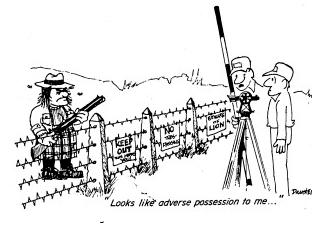Adverse Possession: A Lesson

When it comes to a claim to a property, the doctrine of adverse possession is one of the most important concepts in real estate. The term essentially means the person who possesses a property without the right to do so. It is most commonly used in cases where two people have a legal dispute about ownership of a piece of land. It applies when the land is in a neighbor's front yard, or when it's adjoining.
While adverse possession requires that the owner of a property have exclusive use of the land for several years, the concept is less complicated than it seems. The law requires that the property owner have full and continued knowledge about the use of the land. If the person has used the property in full view of the landowner, they must have acquired a legal right to do so. If the landowner is aware of this, he or she should make sure that the person has not interfered with the use of the area.
A claim of adverse possession often involves a disagreement over property boundaries. For example, a neighbor might build a fence in the back yard, encroaching on the other property. If the neighbor has no right to do so, he or she may be infringing on the other landowner's rights. This is called tacking. This is when the conveyance is based on a mistaken document. When this happens, a lawful owner can reset the clock. Evidence of rent is another way to defeat the "continuous and hostile" element.
In other words, it is difficult to prove that someone has acquired a right to a piece of land without the right to do so. The law does not recognize the infringement of a right to possession if the owner of the property does not have the right to do so. In most states, the person who claims adverse possession must have been using the land in full view of the landowner. That means a person who has a right to use a piece of property without permission will not be able to claim ownership.
Besides having the right to trespass on a neighbor's property must be aware that a title insurance company won't issue a policy unless they are certain of who owns the land. Even when the owner does not want to trespass on a neighbor, he can still sue to quiet the title and claim the land. It is crucial to protect yourself from the trespassing of another party's property.
In a case of adverse possession, the person who is the owner of the land has acquired the right to live in it. The law also recognizes the right of a tenant to live on a neighbor's property. In other words, a property can be occupied by a third party. However, if the law determines that a landlord does not have the right to do so, he may be liable for damages.
Recent Posts
Let's Stay Connected
Follow us on and become part of the PREC community
Never miss a tweet by connecting with us on Twitter
Check our our posts about trends in real estate industry and market







